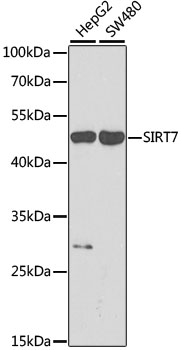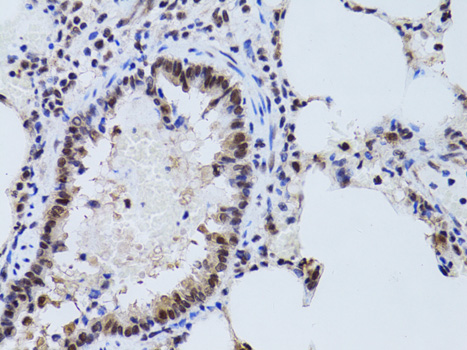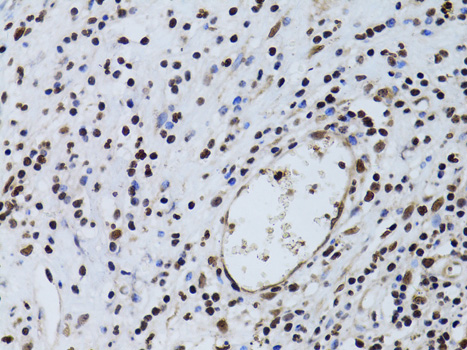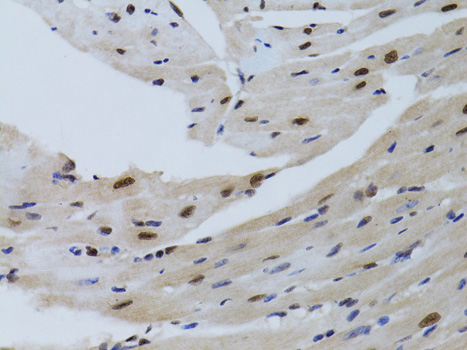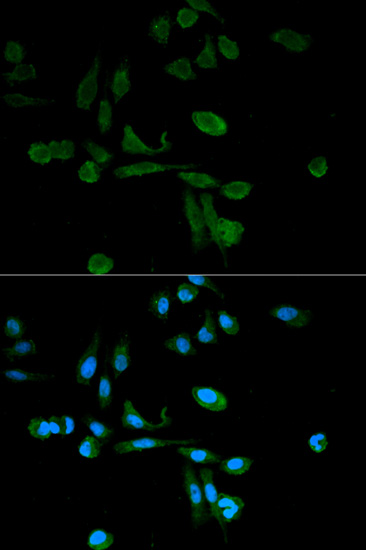Epigenetics & Nuclear Signaling Antibodies 1
Anti-SIRT7 Antibody (CAB0979)
- SKU:
- CAB0979
- Product Type:
- Antibody
- Reactivity:
- Human
- Reactivity:
- Mouse
- Reactivity:
- Rat
- Host Species:
- Rabbit
- Isotype:
- IgG
- Antibody Type:
- Polyclonal Antibody
- Research Area:
- Epigenetics and Nuclear Signaling
Description
| Antibody Name: | Anti-SIRT7 Antibody |
| Antibody SKU: | CAB0979 |
| Antibody Size: | 20uL, 50uL, 100uL |
| Application: | WB IHC IF |
| Reactivity: | Human, Mouse, Rat |
| Host Species: | Rabbit |
| Immunogen: | Recombinant fusion protein containing a sequence corresponding to amino acids 201-400 of human SIRT7 (NP_057622.1). |
| Application: | WB IHC IF |
| Recommended Dilution: | WB 1:500 - 1:2000 IHC 1:50 - 1:200 IF 1:50 - 1:200 |
| Reactivity: | Human, Mouse, Rat |
| Positive Samples: | HepG2, SW480 |
| Immunogen: | Recombinant fusion protein containing a sequence corresponding to amino acids 201-400 of human SIRT7 (NP_057622.1). |
| Purification Method: | Affinity purification |
| Storage Buffer: | Store at -20'C. Avoid freeze / thaw cycles. Buffer: PBS with 0.02% sodium azide, 50% glycerol, pH7.3. |
| Isotype: | IgG |
| Sequence: | NREY VRVF DVTE RTAL HRHQ TGRT CHKC GTQL RDTI VHFG ERGT LGQP LNWE AATE AASR ADTI LCLG SSLK VLKK YPRL WCMT KPPS RRPK LYIV NLQW TPKD DWAA LKLH GKCD DVMR LLMA ELGL EIPA YSRW QDPI FSLA TPLR AGEE GSHS RKSL CRSR EEAP PGDR GAPL SSAP ILGG WFGR GCTK RTKR KKVT |
| Gene ID: | 51547 |
| Uniprot: | Q9NRC8 |
| Cellular Location: | Cytoplasm, Nucleus, nucleolus |
| Calculated MW: | 20kDa/35kDa/44kDa |
| Observed MW: | 45kDa |
| Synonyms: | SIRT7, SIR2L7, sirtuin 7 |
| Background: | This gene encodes a member of the sirtuin family of proteins, homologs to the yeast Sir2 protein. Members of the sirtuin family are characterized by a sirtuin core domain and grouped into four classes. The functions of human sirtuins have not yet been determined; however, yeast sirtuin proteins are known to regulate epigenetic gene silencing and suppress recombination of rDNA. Studies suggest that the human sirtuins may function as intracellular regulatory proteins with mono-ADP-ribosyltransferase activity. The protein encoded by this gene is included in class IV of the sirtuin family. |
| UniProt Protein Function: | SIRT7: NAD-dependent protein deacetylase that specifically mediates deacetylation of histone H3 at 'Lys-18' (H3K18Ac). In contrast to other histone deacetylases, displays selectivity for a single histone mark, H3K18Ac, directly linked to control of gene expression. H3K18Ac is mainly present around the transcription start site of genes and has been linked to activation of nuclear hormone receptors. SIRT7 thereby acts as a transcription repressor. Moreover, H3K18 hypoacetylation has been reported as a marker of malignancy in various cancers and seems to maintain the transformed phenotype of cancer cells. These data suggest that SIRT7 may play a key role in oncogenic transformation by suppresses expression of tumor suppressor genes by locus-specific deacetylation of H3K18Ac at promoter regions. Also required to restore the transcription of ribosomal RNA (rRNA) at the exit from mitosis: promotes the association of RNA polymerase I with the rDNA promoter region and coding region. Stimulates transcription activity of the RNA polymerase I complex. May also deacetylate p53/TP53 and promotes cell survival, however such data need additional confirmation. Belongs to the sirtuin family. Class IV subfamily. 3 isoforms of the human protein are produced by alternative splicing. |
| UniProt Protein Details: | Protein type:Nucleolus; EC 3.5.1.-; Deacetylase Chromosomal Location of Human Ortholog: 17q25 Cellular Component: nucleolus; nucleolus organizer region Molecular Function:chromatin binding; protein binding Biological Process: activation of transcription on exit from mitosis; negative regulation of transcription from RNA polymerase II promoter; rRNA transcription |
| NCBI Summary: | This gene encodes a member of the sirtuin family of proteins, homologs to the yeast Sir2 protein. Members of the sirtuin family are characterized by a sirtuin core domain and grouped into four classes. The functions of human sirtuins have not yet been determined; however, yeast sirtuin proteins are known to regulate epigenetic gene silencing and suppress recombination of rDNA. Studies suggest that the human sirtuins may function as intracellular regulatory proteins with mono-ADP-ribosyltransferase activity. The protein encoded by this gene is included in class IV of the sirtuin family. [provided by RefSeq, Jul 2008] |
| UniProt Code: | Q9NRC8 |
| NCBI GenInfo Identifier: | 38258650 |
| NCBI Gene ID: | 51547 |
| NCBI Accession: | Q9NRC8.1 |
| UniProt Secondary Accession: | Q9NRC8,Q3MIK4, Q9NSZ6, Q9NUS6, A8K2K0, B3KSU8, |
| UniProt Related Accession: | Q9NRC8 |
| Molecular Weight: | 35,851 Da |
| NCBI Full Name: | NAD-dependent protein deacetylase sirtuin-7 |
| NCBI Synonym Full Names: | sirtuin 7 |
| NCBI Official Symbol: | SIRT7 |
| NCBI Official Synonym Symbols: | SIR2L7 |
| NCBI Protein Information: | NAD-dependent protein deacetylase sirtuin-7 |
| UniProt Protein Name: | NAD-dependent protein deacetylase sirtuin-7 |
| UniProt Synonym Protein Names: | Regulatory protein SIR2 homolog 7; SIR2-like protein 7 |
| Protein Family: | NAD-dependent protein deacetylase |
| UniProt Gene Name: | SIRT7 |
| UniProt Entry Name: | SIR7_HUMAN |
View AllClose


